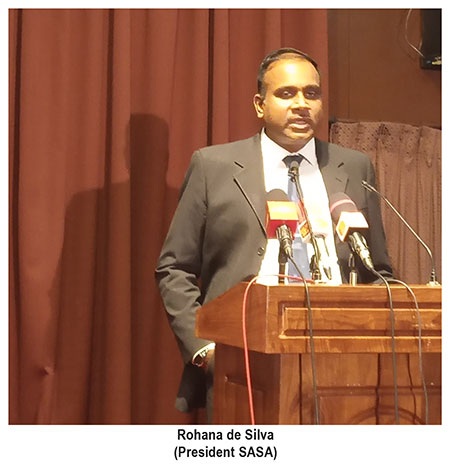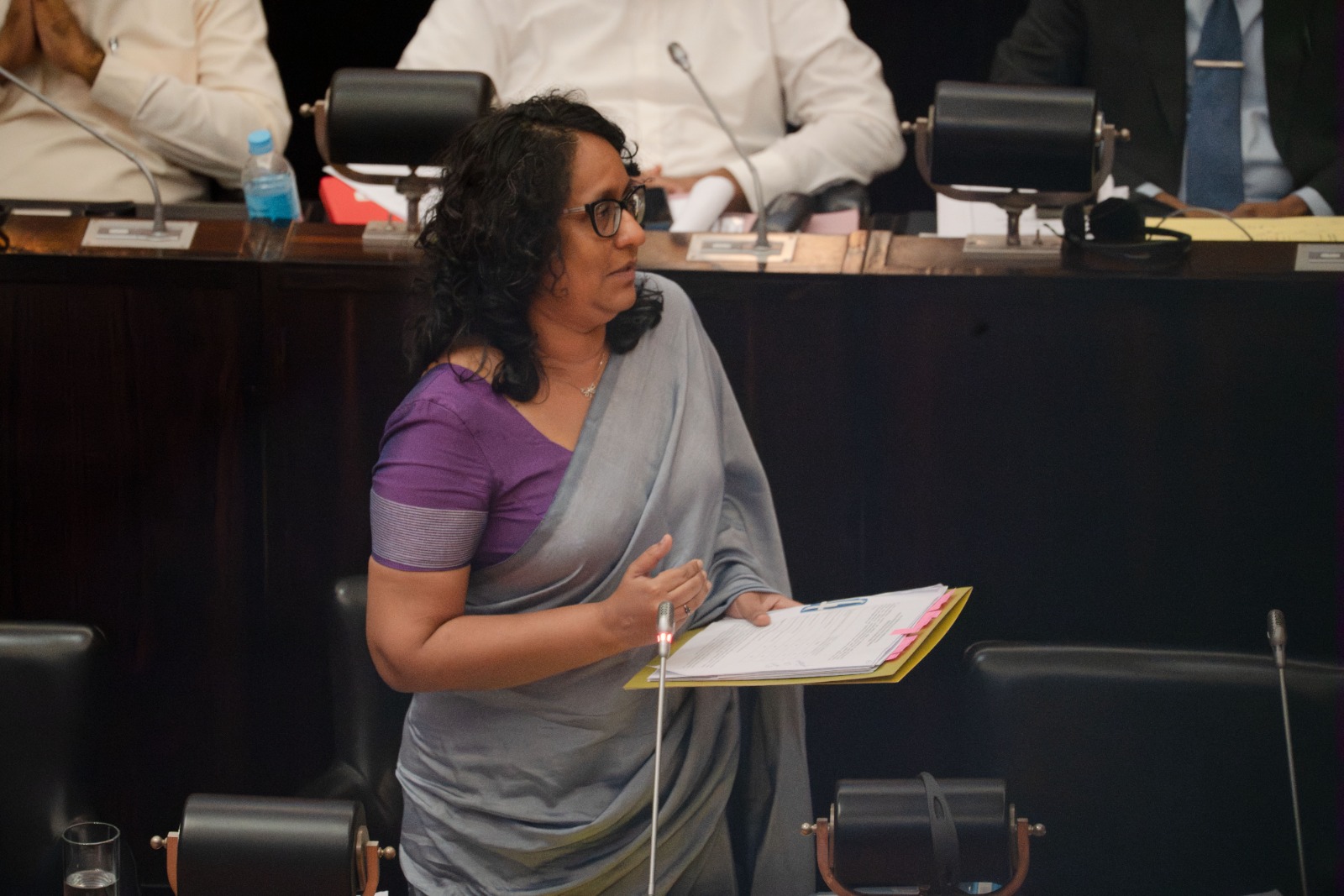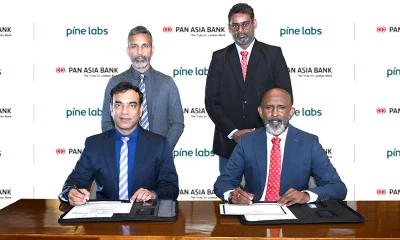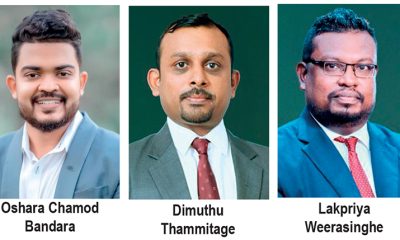News
Administrative Service Association airs its concern about present crisis and proposes reforms

Text and pictures
by PRIYAN DE SILVA
The Sri Lanka Administrative Service Association (SLASA) yesterday (18) aired its concerns about the present crisis the country is facing and submitted its proposals for the economic and social resurgence to a gathering comprising of clergy, members of Parliament, trade union leaders, officials of non-governmental organisations, the media and its members, at the Mahaweli Centre.
President of SLASA, Rohana de Silva, addressing those present, said that wrong economic and social policies had been the root cause of the present situation and admitted that a number of administrative lapses had aggravated it.
He said that the guidance extended to the lawmakers, both individually, and as a union, from time to time, had had no effect at all. Hence the Association had been compelled to present the proposals to others in the public service and the general public before the ongoing economic crisis worsened.
The SASA President said that since 1972 the public service had become subject to the control of the Cabinet-of-Ministers and the public service had been acting according to the whims and fancies of politicians. He added that it was imperative that the public service be an independent professional service to overcome the present crisis.
Among the changes proposed are that the 19th Amendment to the constitution be reinstated, the staff of the President limited, and a 10-member constitutional council be formed to appoint all independent commissions, including the National Procurement Commission, to limit the number of Ministers to twenty five (25) and the number of Deputy Ministers to be limited to 25, as well.
That all Cabinet papers should be approved by a ‘Policy Council’ comprising of persons competent for policy formulation before they are submitted to the Cabinet of Ministers.
SLASA recommends the introduction of provisions to the constitution to strengthen the Commission to investigate allegations of bribery or corruption. SLASA also recommends that the Committee on Public Accounts and the Committee on Public Enterprise be strengthened further to streamline the control of public finance.
Among the proposals for economic management are the reintroduction of the PAYEE tax system, and that all officers who are subject to pay PAYEE tax should pay it from their salaries and not through their institutions. The reintroduction of the Withholding Tax, immediate suspension of tax exemptions, revision of the qualifying level for payment of Personal Income Tax and Value Added Tax, exemption of corporate income tax to be done under a proper methodology.
Recommendations were also made for the agriculture, education, energy and industry sectors.
Welcoming the proposals submitted by SASA, trade union leaders present aired their displeasure that the SASA had not objected to persons outside the service being appointed to administrative posts. It was also suggested that the members of SASA should refuse to carry out orders given by a government which has not been democratically elected or has lost the trust and mandate of the masses.
NGO head Manjula Gajanayaka, who was in the audience, said that it was an encouraging sign that members of the Sri Lanka Administrative Service had openly voiced their concerns.
Gajanayaka added it was the first occasion that the association had stood by the public.
Latest News
Advisory for Severe Lightning for the Western and Sabaragamuwa provinces and Galle and Matara districts

Advisory for Severe Lightning
Issued by the Natural Hazards Early Warning Centre at 12.00 noon 07 February 2026 valid for the period until 11.00 p.m. 07 February 2026
Thundershowers accompanied with severe lightning are likely to occur at some places in the Western and Sabaragamuwa province and in Galle and Matara districts.
There may be temporary localized strong winds during thundershowers.
The general public is kindly requested to take adequate precautions to minimize damages caused by lightning activity.
ACTION REQUIRED:
The Department of Meteorology advises that people should:
Seek shelter, preferably indoors and never under trees.
Avoid open areas such as paddy fields, tea plantations and open water bodies during thunderstorms.
Avoid using wired telephones and connected electric appliances during thunderstorms.
Avoid using open vehicles, such as bicycles, tractors and boats etc.
Beware of fallen trees and power lines.
For emergency assistance contact the local disaster management authorities.
News
INS GHARIAL departs island

The Indian Naval Ship (INS) GHARIAL which made a port call in Colombo, departed the island on 06 Feb 26.
The Sri Lanka Navy bade a customary farewell to the departing ship at the Port of Colombo, following naval traditions.
During the ship’s port call, the crew took a sightseeing tour of key attractions in Colombo.
The visit also featured the handover of ten temporary Bailey Bridges, which were brought by INS GHARIAL, in coordination with the High Commission of India in Sri Lanka.
News
Stop the collection of funds from parents at school level for Smart Boards — PM

Prime Minister Dr. Harini Amarasuriya stated that the Ministry of Education has already commenced the distribution of Smart Boards required for the new education reforms, and that the collection of funds from parents at school level for this purpose must be stopped immediately. She further emphasized that no decision has been taken to curtail free education or to close the Jayewardenepura Faculty of Dental Sciences.
The Prime Minister made these remarks in response to a question raised in Parliament on Thursday [05th February] by the Leader of the Opposition, Sajith Premadasa.
Elaborating further, the Prime Minister stated,
“Although the Leader of the Opposition has not traditionally upheld free education as a policy, I appreciate your stance on the matter at this juncture. However, I urge that questions should not be raised based on social media content or unverified rumours in Parliament. No decision has been taken to curtail free education or to close the Jayawardenepura Faculty of Dental Sciences. The Medical Faculty of the Wickramarachchi University of Indigenous Medicine had commenced operations without regulatory approval and had introduced course work, resulting in students being placed in a vulnerable situation. Necessary action is currently being taken based on the recommendations of a report submitted by an expert committee appointed to examine the issue. This this is not a political decision, but one guided by expert opinion”.
“Arrangements are underway to distribute the required Smart Boards to schools during this year, and there is no need to collect funds from parents for this purpose. If any such collections are taking place, they must be stopped immediately. The Secretary to the Ministry of Education has already issued a directive instructing schools not to collect funds from parents”.
“The subject Information Technology will not be taught as a separate subject for Grades 1 to 5. However, recognizing the need to prepare students for a globally advancing technological world, discussions have been initiated based on expert advice on how to provide age-appropriate technological awareness to students. Decisions will be made after carefully considering child protection concerns and expert recommendations. The curriculum-related decisions will not be made politically, but by subject experts.
Based on the requests made by the universities and higher education institutions recruitment for essential academic vacancies is currently being carried out under the Cabinet approval. Although thirty years have passed since the establishment of the teacher service, further measures are required to enhance its quality. Existing issues relating to teacher promotions, considering the practical difficulties in evaluation processes and non-compliance with service minute provisions are being addressed alongside other challenges. The government is presently focused on formulating a systematic plan to ensure quality education.”
Responding to a question raised by the Member of Parliament Kader Mastan, the Prime Minister stated,
“Several programmes have been introduced based on government policy decisions to fulfill the basic needs of schoolchildren. These include the provision of school textbooks, uniforms, and the “Suraksha” health insurance scheme. Additionally, voucher schemes have been introduced to support the purchase of sanitary products for girls in Grades 6 to 13. Midday meals are also being provided for primary school students, and financial assistance is extended to students who pass the Grade 5 Scholarship Examination but do not receive bursaries. The Ministry of Education is in the process of gathering further information with the intention of expanding these programmes”.
The Prime Minister also announced that the 2025 G.C.E. Ordinary Level Examination is scheduled to be held from February 17 to 26. Although this period coincides with the observance of Ramadan, relevant authorities have confirmed that it will not pose an obstacle to the conduct of the examination. Furthermore, it has been decided to hold the Grade 5 Scholarship Examination and the G.C.E. Advanced Level Examination before August each year, and the G.C.E. Ordinary Level Examination in December. From 2026 onwards, efforts will be made to conduct examinations in accordance with this revised annual examination calendar.
[Prime Minister’s Media Division]
-

 Business5 days ago
Business5 days agoSLIM-Kantar People’s Awards 2026 to recognise Sri Lanka’s most trusted brands and personalities
-

 Business23 hours ago
Business23 hours agoZone24x7 enters 2026 with strong momentum, reinforcing its role as an enterprise AI and automation partner
-

 Business7 days ago
Business7 days agoAltair issues over 100+ title deeds post ownership change
-

 Business7 days ago
Business7 days agoSri Lanka opens first country pavilion at London exhibition
-

 Business6 days ago
Business6 days agoAll set for Global Synergy Awards 2026 at Waters Edge
-

 Business5 days ago
Business5 days agoAPI-first card issuing and processing platform for Pan Asia Bank
-

 Business23 hours ago
Business23 hours agoHNB recognized among Top 10 Best Employers of 2025 at the EFC National Best Employer Awards
-

 Business7 days ago
Business7 days agoESOFT UNI Kandy leads the charge in promoting rugby among private universities













